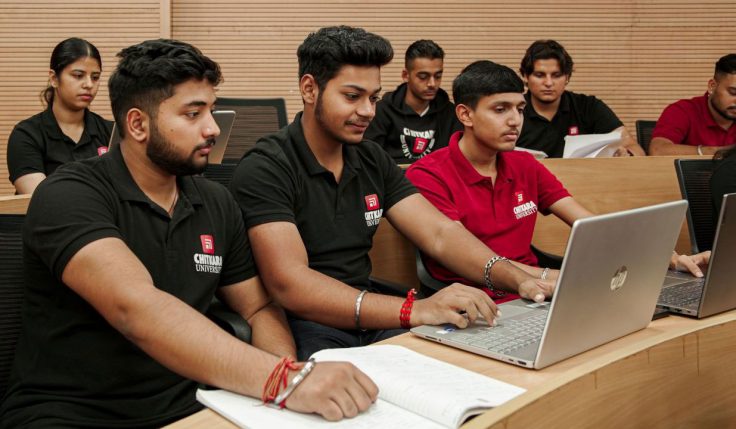Top Advantages of Fully Residential MBA in India: Doing an MBA is considered one of the major steps that any professional takes in his/her life because of the high possibility of greater career prospects opening with increased earning potential. However, among other available options, a fully residential MBA in India will be prodigious for the immersive experience it allows with numerous advantages:. In this blog, we would be elaborating on the top advantages of joining a fully residential MBA program and focus on some of the finest courses related to Banking and Financial Services in India.
Holistic Learning Environment
One of the biggest advantages of a fully residential MBA is perhaps the richest immersion into learning. Besides being intensively involved with academics, students participate in extracurricular activities, workshops, and guest lectures. Such all-round development nurtures personal growth, developing key soft skills like effective communication, teamwork, and leadership-skills that form the backbone of employees in any corporate setup.
Networking Opportunities
It instills a sense of community and social interaction between the students, faculty members, and industry professionals. If the program is a full residential, this will help students forge very strong relationships that could last well into and after their college careers. Such networking with a diverse set of people coming from different walks of life and industries can really help in developing permanent connections that are helpful in the quest for internships or job placements, especially in the field of Banking and Financial Services.
Access to Faculty Expertise
Fully residential programs tend to have a higher element of full-time faculty with rich experience in the industry. This, in turn, has easy access to such faculty members for insights into sectors, which include Finance. The regular faculty members who worked or are working in Banking and Financial Services are in the best position to mentor and provide guidance for enhancing learning.
Focused Learning Experience
Students in a full-time residential MBA program can be fully involved in their studies without distractions from outside commitments, whether in their families, jobs, or preoccupations with other things. The focus among the students leads to absorption of course material and creating an engaging environment toward active discussions, projects, and peer-to-peer learning. The residential setting is generally much more intense and may have a life-changing effect on education not as easily accomplished in part-time or online programs.
Case Studies and Live Projects
Most reputed management programs in India that have Banking and Financial Services incorporated into their curriculum do include case studies and live projects as a regular part of their syllabus. In the residential setup, students can work collaboratively on real-world challenges throughout their program. Besides solidifying the learning process, such hands-on experiences prepare the graduates with practical experience they can show while joining the job market.
Leadership Skill Development
The residential nature of an MBA course places much emphasis on developing leadership skills. With various workshops, group projects, and team-building exercises, students are taught how to lead effectively both individually and in a team, so they can perform effectively at managerial levels in the future. This development with regard to leadership competencies has special relevance for those who wish to climb the ladder in areas like Banking and Financial Services, where decision-making by the leadership is called for most often.
Specialization Alternatives
Residential or Full-time MBA programs in India have a number of specializations. The other courses of specialization are MBA in Banking and MBA in Financial Services. These specialized courses will have detailed courses of study so that students will become experts and well-versed with matters related to industry trends, regulations, and financial instruments which are the key factors that define success in such competitive arenas.
Following are some of the best courses in an MBA available within India for such specializations:
MBA in Banking:The course structure generally covers studies related to retail and corporate banking, risk management, financial regulations, and investment banking. Students gain knowledge to deliver effectively in banking.
MBA in Financial Services: The course covers investment management, wealth management, and financial planning, among other areas, truly preparing students for the challenges that come with the complex financial services industry.
Cultural Exposure and Diversity
Residential MBA programs have usually got this mixed bag of geographical and cultural diversity, and such an eclectic mix encourages students to learn from the experiences of their cohorts by furthering the cause of cultural understanding and sensitivity so essential in today’s globalized business arena.
In a nutshell, a fully residential MBA course in India encompasses most of the advantages one student can get from his education and career point of view. Starting with the holistic learning environment and networking opportunities to the specialized courses such as MBA in Banking and MBA in Financial Services, these programs offer enriching experiences for students that prepare them for life. If you are considering an MBA degree, then probably residential can be the way to achieve your professional dreams.
Be it a career in finance, banking, or any other sector of your interest and choice, the fully residential MBA can be a perfect launchpad.
In this context, the MBA in Banking, Financial Services, and Insurance at Chitkara University is designed to engage students in the best skills and knowledge to take up valuable opportunities arising in the fast-evolving BFSI sector. Intensive and project-driven, this two-year program provides an enrichment of comprehensive academic course work coupled with practical use in order to enrich students’ studies in banking, financial services, and insurance. Interdisciplinary learning on finance, mathematics, and statistics is integrated into the core of the Program to meet dynamic challenges presented by professionals in these fields.
Also, read this blog post: How Does an MBA in Financial Services and Planning Help You Lead in the Financial Sector?
The main advantages of pursuing this industry-integrated MBA in BFSI are enormous growth opportunities in one of the fastest-growing industries. With the banking sector likely to generate over 10 million jobs for India’s workforce in these coming years, graduates can look forward to a very stable and secured career path, which is essentially recession-proof in nature. The program also focuses on all-round skill development-strategic thinking and risk management-which makes it very attractive to students who are thinking about job opportunities with highly remunerative salaries and opening avenues all over the world.
Because of the learning outcomes of this program, it is guaranteed that students will be able to contribute something worthwhile in the field of banking and finance upon graduation. Such a student will develop a firm foundation in theoretical concepts and practical applications that shall enable him or her thereafter to analyze risks, utilize financial decision-making models, and understand the economic implication of each of his or her decisions. This level of insight will make the graduate very attractive to the employers seeking best-in-class talent.
The course structure seems to have been appropriately designed into three major modules: Banking, Financial Services, and Insurance. In each module, certain key aspects will be dealt with, including retail and corporate banking, new technologies in the financial sector, and the importance of insurance in managing risks. This diversified approach will ensure that students will gain an all-round education to become experts in performing diverse responsibilities within the BFSI industry.
The eligibility for admission to this course is a Bachelor’s Degree with 50% marks in the aggregate and entrance exams, if applicable or Chitkara University Test. Application processing undergoes a facile submission process after which select candidates shall be permitted to embark on their professional journey into commercial banks, investment funds, insurance firms, and capital markets. Join Chitkara University to begin building your career as a future leader in Banking and Financial Services!






